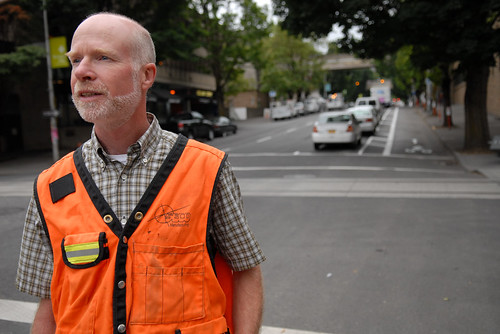
(Photo: J.Maus/BikePortland)
Two people whose judgment calls have shaped Portland’s streets for years — in one case, for decades — are stepping into jobs elsewhere.
Rob Burchfield, Portland’s top traffic engineer since 1999 and a nationally respected innovator on bike-friendly street designs, will leave the city on Friday after almost 30 years. He’s becoming the regional engineering director for Toole Design Group, a national engineering and design firm that specializes in biking and walking projects.
Meanwhile, Multnomah County Engineer Brian Vincent will leave his job April 3. Vincent, whose agency oversees most of downtown Portland’s bridges and many roads outside city limits (Sauvie Island’s, among others), will “pursue a long time career goal of serving as a public works director” by taking that position at San Juan County, Wash., county spokesman Mike Pullen said.
Vincent has been with the county since 2007, when he came across the Columbia River from Clark County Public Works.
Burchfield and Vincent’s successors will oversee things from the use of color on local streets to whether the Burnside Bridge needs right-turn lanes to the best spots for bike-specific traffic signals.
The turnover may bring changes to both agencies. Burchfield’s departure is prompting shifts in the Portland Bureau of Transportation’s organization chart, with Director Leah Treat assuming some of Burchfield’s legal responsibilities.
“I have made the decision to move Traffic District Operations and Traffic Design into Engineering Services,” PBOT Director Leah Treat explained in a Feb. 20 email forwarded by PBOT spokeswoman Diane Dulken. “Carl Snyder and Lewis Wardrip will be reporting to [Chief Engineer and Engineering Services manager] Steve Townsen. This will allow for stronger coordination between their Divisions and the Signals and Streetlights Division. This leaves open the question of who will be the City Traffic Engineer. We are working on changes to Title 16 to give all the Traffic Engineer responsibilities to the Director and I will then delegate them among Carl, Lewis and [Signals and Streetlights Division Manager] Peter [Koonce] as makes sense. This change will help current division of duties and also give future Directors the flexibility to deal with changing environments.”
Advertisement
Burchfield is generally well-liked among local bicycling advocates. His new bio at Toole sums it up:
Inspired by a study tour to Amsterdam and Copenhagen, Rob was responsible for implementing many new and innovative design treatments on Portland’s streets. His experience spurred him to conceive and lead the development of the NACTO Urban Bikeway Design Guide. Rob’s achievements earned him the 2009 Public Sector Professional of the Year award from the Association of Pedestrian and Bicycle Professionals.
“Rob has been just a great engineer to work with,” said Bicycle Transportation Alliance Engagement Manager Carl Larson. “He’s willing to try new things and really saw the promise that bikes gave cities. I think he really embraced biking as a way to solve a lot of traffic woes. And I think his work with NACTO was huge.”
Burchfield’s new gig also represents a bit of news in the world of local bikeway engineering.
Toole, based in Washington D.C. since its founding in 2003, is one of the country’s two major engineering firms that work mostly in bicycle and pedestrian projects. The other is Portland-based Alta Planning and Design — whose local office is led by Mia Birk, a former colleague of Burchfield’s at the City of Portland.
By hiring Burchfield to open its first Portland office, Toole is stepping squarely into Alta’s home turf and will surely be competing with Alta and other companies for contracts with cities, counties and states in the region.
To us, this just sounds like the latest sign of private-sector confidence in the future of bike infrastructure. Let’s hope the public servants who step into Burchfield’s and Vincent’s current work have similar confidence.


